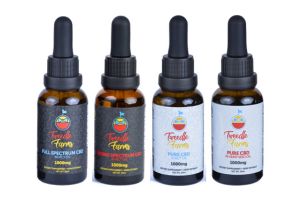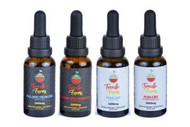Difference Between Broad Spectrum, Full Spectrum CBD, Complete Spectrum & Pure CBD | Tweedle Farms
Posted by Tweedle Farms on Apr 16th 2021

When people talk about CBD products, they often talk about the type of CBD it is: full-spectrum, broad-spectrum, or Pure CBD (AKA CBD isolate). Since these are specific terms that need explaining, we decided to dedicate an entire blog to educating our shoppers about what these words mean, how these products are made, and how they’re different.
What is the difference between complete spectrum, full-spectrum, broad-spectrum, and CBD isolate?
CBD Isolate Products
There is only pure CBD extract in CBD isolate--not one terpene, any other minor cannabinoid, flavonoids, or any other part of the cannabis plant is found in this pure CBD product.
Here are some CBD Isolate products:
- Pure CBD in Hemp Seed Oil
- Pure CBD in MCT Oil
- CBD Gummies (Strawberry, Orange, Blue Ras)
- CBD Sublingual Tablets
Full-Spectrum CBD Products
This means the full spectrum of terpenes and cannabinoids, along with no more than 0.3% total THC (+/-MU). Other full-spectrum CBD products include:
Broad-Spectrum CBD Products
This is full-spectrum CBD but without any THC. That means all the terpenes and cannabinoids you’d expect from full-spectrum CBD, just without THC. Curious to give it a try? Check out our Broad Spectrum CBD Oil as well as some of our ratio-ed cannabinoid products like our 2:1 CBD:CBN Oil or our 2:1 CBD:CBG Sublingual Tablets.
Complete Spectrum CBD Products
This is an entirely new kind of CBD product that goes far beyond full-spectrum. It’s a CBD product that contains a higher number of unique cannabinoids than any other oil on the market, as well as a higher amount of each one. For a deep dive into Complete Spectrum, check out this blog post or our Rainbow Complete Spectrum CBD Oil.
What are CBD and THC, and how are they different?
Both CBD and THC are cannabinoids. THC has psychoactive properties, but CBD does not. The human body processes cannabinoids with the endocannabinoid system (ECS). The ECS makes endocannabinoids, which are neurotransmitters that are similar enough to the cannabinoids produced by the cannabis plant that the ECS can process cannabinoids as well.
The ECS is a vital part of the human organism. Endocannabinoids travel through the bloodstream, participating in every bodily process by attaching to cells and letting them know what’s happening in the body and what the cell should do.
Here are just some examples of what the ECS is involved in regulating.
- Inflammation regulation
- Skin maintenance
- Stress regulation
- Motor control
- Appetite
- Mood
- Sleep
Should I take full-spectrum CBD, broad-spectrum CBD, or CBD isolate?
There are several reasons to try CBD Isolate.
- You want to avoid THC
- You want large doses of CBD
- You’re going to take a drug test and want to reduce your risk of testing positive for THC (although it’s not a 100% guarantee that you will pass because, in some people, CBD produces the same metabolites as THC).
There are several reasons to try full-spectrum.
- You want to experience the entourage effect. With less than .3% THC, you shouldn’t have a psychoactive experience
- You want an earthy flavor, which is the natural flavor of unflavored full-spectrum CBD oil
- You want a less processed product. CBD isolate requires more processing during production
There's one important reason to try broad-spectrum CBD.
- You want everything that full-spectrum CBD has to offer without any THC
How do you make full-spectrum, broad-spectrum, and CBD isolate?
Chromatography is the name of the entire process that allows us to isolate CBD and multiple cannabinoids from the different parts of CBD oil so that we can have either full-spectrum, broad-spectrum, or CBD isolate.
Chromatography entails taking the substance that you want broken down and passing it through a medium in which the substance’s constitutive parts move at different rates, which is what allows you to separate out the beneficial compounds from the parts you don't want.
There are five steps to chromatography.
- Extraction
- Winterization
- Filtration
- Decarboxylation
- Distillation
Winterization is the very specific part of chromatography where the separating out of different parts of CBD oil actually happens. You’ve actually seen winterization in person if you’ve ever cooked some meat and then had the fat gelatinize and separate.
To break it down further: winterization entails taking a nonpolar substance (raw hemp oil) and dissolving it in a polar solvent (ethanol) at temperatures below zero. You have to do this at temperatures below -112°F for at least 24 hours to get all the parts you don’t want to coagulate so you can filter them out, which is made faster by the use of vacuums (filtration also has to occur at these same temperatures).
What is MCT oil, and why does it work well with CBD?
MCT oil improves the bioavailability of CBD oil. MCT oil is pure medium-chain triglycerides, which are fatty acids. They help CBD basically go around the stomach and end up right in your digestive tract, where the CBD oil is absorbed at a greater rate, which means it has improved bioavailability (bioavailability is the measure of how much a substance can be metabolized). The caprylic acid found in MCT is what’s responsible for improved bioavailability.
MCT is made from 100% coconut oil, palm oil, or sometimes a mix of the two. It’s all-natural. It’s also safe for pets.
When CBD oil is mixed with MCT oil, it becomes less viscous. Some companies also use MCT oil to make the CBD distillate that’s used in CBD vape cartridges less viscous. We do not. We use pure hemp-derived terpenes to make our CBD distillate less viscous.
What is hemp seed oil?
Hemp seed oil should not be confused with hemp-derived CBD oil, even though they both come from the hemp plant. Pressed hemp seeds, which have no CBD, are the source of hemp seed oil. CBD oil, meanwhile, is made from hemp flowers, leaves, and stalks, which is where CBD and other cannabinoids are found. Little to no CBD is actually contained in the leaves and stalks.
Fun fact: marijuana and hemp are both cannabis plants. The difference is that hemp is cannabis that has less than .03% THC content by dry weight.
What is the CBD entourage effect?
The “entourage effect” is believed to be an added benefit that occurs when you consume CBD along with the other cannabinoids, terpenes, etc that are found in hemp. Tweedle Farms is working on a Rainbow formulation of CBD oil that will contain the greatest amount of different cannabinoids on the market. More on that soon enough!
What are some different cannabinoids?
All of these cannabinoids will be found in our forthcoming Rainbow CBD oil.
CBG
CBG (cannabigerol) is a non-psychoactive cannabinoid that's the precursor to THC and CBD. CBG becomes THC and CBD once it’s broken down by enzymes.
CBN
CBN (cannabinol) is a cannabinoid that results from the natural degradation of THC,, primarily through it's drying, curing, storing and also through the heating of cannabis/hemp.
CBDa
CBDa (cannabidiolic acid) is the precursor to CBD. CBDa becomes CBD over time and when exposed to heat. Curious to learn more? There's lots of information in this blog post.
THCa
THCa (tetrahydrocannabinolic) is a precursor to THC. THCa has no psychoactive properties. It becomes THC when it's exposed to heat and light.
CBGa
CBGa (cannabigerolic acid) serves two roles in the cannabis plant: it triggers natural leaf pruning so that the cannabis plant is able to more effectively direct energy toward the flower, and it's a precursor to THCa, CBDa, and CBCa.
CBC
While many cannabinoids increase the production of the body’s own endocannabinoids, CBC (cannabichromene) is believed to also aid the endocannabinoids themselves.
CBDv
CBDv (cannabidivarin) is found in strains that are naturally lower in THC and strains that are naturally higher in CBD.
What are terpenes?
Terpenes are aromatic oils that provide cannabis with unique scents and flavors like citrus, berry, mint, and pine. Terpenes are produced by the same glands of the cannabis plants that produce other cannabinoids. Terpenes are found in broad and full-spectrum CBD.
What are flavonoids?
Flavonoids are naturally occurring compounds found in plants. Flavonoids are known as secondary metabolites, which are organic compounds that aren't involved with growth, development, or reproduction but instead improve an organism’s chances of survival or reproduction. Flavonoids, for example, play an important part in plants’ defense mechanisms. Humans use flavonoids for various purposes, including as pigments and flavorings. Flavonoids are found in broad and full-spectrum CBD.
How do I store CBD oil?
Tweedle Farms recommends keeping our CBD products in their original packaging to reduce unnecessary exposure to air. CBD oil should be kept at room temperature, which is between 60 to 70°F (16 to 21°C). Keep CBD oil in the dark and out of the light. Pantry, cupboards, drawers, and closets are good places to store CBD. Keep CBD out of the reach of children as well.
Can I cook with CBD oil?
Yes, follow our recipe for homemade CBD-infused MCT oil.
Can I give CBD oil to my pets?
Yes, you can give CBD to cats or dogs so long as it’s formulated for them. Giving your pets CBD that’s formulated for humans can be risky.
- Pets need much less CBD than humans.
- PEts can experience THC toxicity, so CBD for cats is formulated without THC.
- CBD for pets is formulated to exclude terpenes that would be okay for humans but would excessively tax the pets’ livers.
- CBD for pets is formulated to exclude other ingredients that would be harmful to pets but okay for humans, like chocolate.
So, give your pets CBD oil that’s formulated just for them.
Does CBD oil get you high?
CBD doesn't have a psychoactive effect.
Are Tweedle Farm’s CBD oils third-party tested?
Yes, we use Green Leaf Labs, a state and internationally accredited lab (iso 17025) that checks our CBD oils and concentrates using industry-approved methods to verify their cannabinoid content and the absence of harmful chemicals and heavy metals.
Are Tweedle Farm’s hemp products derived from hemp grown without pesticides, chemicals, and synthetic fertilizers?
Yes, cannabis is a bioaccumulator, which means that it’s particularly effective at sucking up whatever’s in the soil, which can end up in whoever consumes the cannabis. For this reason, all our products are sourced from hemp that’s grown all naturally. All those chemicals also lead to poorer quality hemp plants.
Can I pass a drug test after consuming full-spectrum, broad-spectrum, or CBD isolate oil?
Drug tests don't check for CBD. However, some do test for THC. Since some CBD products have THC in them, they have the potential to produce a positive result on a drug test. That's why Tweedle Farms doesn't guarantee that you'll be able to pass a drug test after consuming products that have trace amounts of THC.
Bottom Line
Now that you know the different types of CBD oil that are out there, you can experiment with finding out which one works best for you. If you have any more questions, please contact us directly. Your questions inspire our blogs, so we love hearing from you! As always, take advantage of our rewards program so that we can help make it easier for you to enjoy our products.



